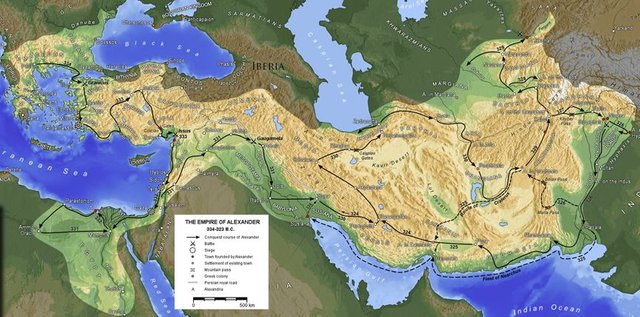334 BC BC: Departure to Persia The fact that Alexander is not planning a short expedition to Asia is already evident in his plans. He has mobilized a good 35,000 foot troops, plus about 5,000 riders to become Alexander's main weapon.
Only about half of the force consists of Macedonians, the rest of the allies have mustered, which put an additional 160 warships.
But the king keeps thinking: he also takes the court with his philosophers, artists, doctors and priests. When he crossed the Dardanelles in the spring of 334, his army resembled a small migration. However, before Alexander plunges into war, he visits the tomb of Achilles. Only when he has honored the hero of Troy, he feels ready for the coming battles. Now he loses no time and collides with the Persians on the river Granikos for the first time.
For Alexander, who deceives the enemy with a fake attack of his cavalry, the first collision ends almost deadly. Only the courageous intervention of his friend Kleitos saves him from the sword of an attacker. However, this incident can not jeopardize the victory of the Macedonians. He devotes the spoils of his first success to the gods and has them sent to Athens with sacred inscriptions.
Instead of immediately penetrating further into the interior of the Persian Empire, Alexander now breaks southwest. He wants to conquer the Greek coastal cities, which are still under Persian rule. Behind this is not only the intention to keep his back for later actions, but he also deliberately wants to rob the superior Persian Mediterranean soul of their bases. However, Alexander does not meet with Darius III, the great-grandson of Darius the Great and king of the Persian Empire. It is still the task of the satraps, the respective provincial administrators, to lead the fight against the Macedonians.
333 BC Chr .: First collision with Darius With each further victory shows that Alexander is not only a skilled strategist, but also a forward-looking politician. When he conquers the coastal cities and key bases, he has the defeated satraps replaced by allies, but they occupy the same position and maintain the Persian administrative apparatus. Alexander staged himself more as the successor of Darius than as an occupier. Even at this early stage he provides for a balance between Greeks and Persians.


Alexander is a shrewd strategist in battle.
post a very good friend.
best regards from me @muftii
Downvoting a post can decrease pending rewards and make it less visible. Common reasons:
Submit
Downvoting a post can decrease pending rewards and make it less visible. Common reasons:
Submit
WARNING - The message you received from @sitisahro is a CONFIRMED SCAM!
DO NOT FOLLOW any instruction and DO NOT CLICK on any link in the comment!
For more information, read this post: https://steemit.com/steemit/@arcange/phishing-site-reported-steemitservices-dot-ml
Please consider to upvote this warning if you find my work to protect you and the platform valuable. Your support is welcome!
Downvoting a post can decrease pending rewards and make it less visible. Common reasons:
Submit